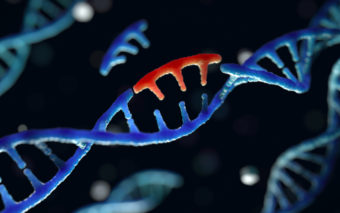Epigenetics: How Environmental Factors Impact Heritable Health Traits
Posted: September 18, 2020 | By: Steve Wallach

By Youngevity Co-founder and CEO Steve Wallach
In our last blog, I discussed the relationship between my father, Dr. Joel Wallach, and Dr. Gerhard Schrauzer, which eventually led to their co-authorship of Epigenetics, The Death of The Genetic Theory of Disease Transmission. Epigenetics is an emerging field of science that studies alterations in gene expression, caused by factors other than changes in the DNA sequence.
As one of the hottest fields in the life sciences today, epigenetics’ impact on key aspects of biology and potential in human medicine cannot be overstated. Undeniably, the gaps it fills in our scientific knowledge are changing the way we view relationships between nutrition, genetics, and disease. And in addition to my father and Dr. Schrauzer, myriad of people have contributed to its evolution over the decades—suffice it to say, there are many stories to tell about this exciting field. But in this blog my goal is to explain epigenetics in terms that are hopefully easy to understand.
ORIGINS OF THE WORD

The term epigenetics, which literally means “above” or “on top of” genetics, was first coined in 1942 by Conrad H. Waddington, a British developmental biologist, embryologist, and geneticist at Cambridge University. Little was known about the hereditary role of genes at that time, and until the 1950s the term was used to describe how a fertilized egg becomes a mature organism.
But in 1956, Waddington published a paper in the journal Evolution, which showed that a response to environmental stimulus could cause the inheritance of specific characteristics in a population. And by the mid-1980s, epigenetics was used more precisely to describe heritable traits that don’t involve alterations to the underlying DNA sequence.
So, what does all of this mean to you and I? Simply put, epigenetics establishes that genes alone do not make us. In fact, environmental factors such as diet, lifestyle choices and behaviors, and stress can not only alter your health, but also the health of your offspring.
 INHERITING OUR PARENT’S EXPERIENCE
INHERITING OUR PARENT’S EXPERIENCE
In 2007, a breakthrough experiment truly surprised the world of biology. Mice with a gene called Agouti— responsible for yellow color, diabetes, and obesity—were fed a food source of methyl groups, which are essential for preventing obesity in adult mice. Amazingly, their born offspring were brown, slim, didn’t suffer from diabetes, and lived for a very long time. The Agouti gene still existed in their cells, but was inhibited by the methyl groups, and this was even true of the next generation of mice.
The conclusion? We’re not only what our parents ate, but also what our grandparents ate. And food is only one determining factor in this generational cycle. Whether we smoke, move frequently, or even think positively can all influence changes in our epigenome. Notably, this discovery came as no surprise to people like my father and Dr. Schrauzer. In fact, it only reinforced my father’s landmark selenium discovery in 1979, as an assistant pathologist at Emory University’s Yerkes National Primate Center in Atlanta.
The center was collaborating with NASA on a space research program that focused on a small colony of monkeys, which led to my father’s discovery of the first non-human case of cystic fibrosis. One of the babies had died of classic symptoms, so my father then conducted liver biopsies on each member the colony, all of whom came from different mothers and fathers. He determined that each one had the disease, and even more remarkably, that it was caused by a selenium deficiency in their diet. These historic findings, although met with much opposition and skepticism at the time, helped establish that diseases could be transmitted by factors other than genetics.
 WHAT DOES THIS ALL MEAN FOR FUTURE GENERATIONS?
WHAT DOES THIS ALL MEAN FOR FUTURE GENERATIONS?
Following traditional genetics, major changes in the human genome only happened over many generations or even thousands of years. But epigenetics reveals how these changes can happen much faster—that new genetic traits can appear in a single generation and be passed on to kids, grandkids, and beyond. For example, evidence suggests that smoking and overeating can “switch on” genes that affect obesity and “switch off” those carrying messages for longevity.
According to Soania Mathur of the Michael J. Fox Foundation for Parkinson’s Research: “Genetics loads weapons, but it is epigenetics that pulls the trigger.” I like this metaphor, which basically tells us that DNA is not our destiny, although it plays a huge role in shaping it. It also tells us that pulling the trigger (epigenetics) doesn’t only apply to passing on negative traits or health risks, but also to inheriting healthy, beneficial traits.
This means living healthier now could be vital to your future generations, which is good news for anyone who wants to take charge of their own wellness
 EPIGENETICS AND 90 FOR LIFE
EPIGENETICS AND 90 FOR LIFE
As I’ve stressed throughout this blog series, my father has been spreading his message of better health through better nutrition for over 40 years. His work is the foundation of our 90 For Life philosophy (the 90 essential nutrients we all need) and has always been right in line with the concept of epigenetics.
For decades he’s lectured about the impacts of environmental factors like commercial farming, which have depleted nutrient levels in our soil, preventing us from getting the nutrition we need from food alone. And more pointedly, that this nutrient deficiency impacts our health in negative ways that can be passed down to our children. Take selenium, for instance, a deficiency of which caused cystic fibrosis in the aforementioned monkey colony. Selenium can’t even be produced by our own bodies, yet the effects of this dietary deficiency were passed down to the next generation of monkeys (we’re not only what our parents and grandparents ate, but also what they didn’t eat).
But all of this should also give you hope for the future. For so long we’ve been told that genetics, alone, determine our health destiny, but now we know our own behavior is equally important to this outcome. Through a sound diet of whole foods, a proper fitness routine, and supplementing with essential nutrients, you can “turn on” those genes that help you and your future generations. Furthermore, by educating yourself on the evolving field of epigenetics you can apply that knowledge and pass it down to those who matter most in your life.
RECOMMENDED READING
To give you a deeper understanding of epigenetics, I’ve listed some terrific books below to get you started on your educational journey. Happy reading!
Epigenetics, The Death of The Genetic Theory of Disease Transmission
Central to the book’s theme is the connection between nutrition and so-called genetic disease, which is the direct result of decades of collective research conducted by my father and Dr. Schrauzer. Most importantly, it challenges the dogma and misinformation spread by medical institutions and doctors resistant to change.;
Here my father collaborates with Dr. Ma Lan for a comprehensive look at the physical, emotional, and social problems attributed to mineral deficiencies in our soil and food supply.
The Epigenetics Revolution: How Modern Biology Is Rewriting Our Understanding of Genetics, Disease and Inheritance
DNA alone doesn’t tell us enough about how an organism behaves and interacts with its environment. This book details how epigenetics can change the way we look at organisms.
The Biology of Belief: Unleashing the Power of Consciousness, Matter, & Miracles
Among other stunning discoveries, this book shows that genes and DNA do not control our biology, that instead DNA is controlled by signals from outside the cell.
The Developing Genome: An Introduction to Behavioral Epigenetics
In spite of the importance of this research, behavioral epigenetics is still relatively unknown to non-biologists. This introduction allows readers without a background in biology to learn about its revolutionary implications.
Posted in:
Leave a Reply
You must be logged in to post a comment.


I can not express how grateful Dave and I appreciate Doctor Wallach sharing this message that he Researched and taught a generation of people to pick up their lives and secure it, before they realize so many years have passed with out this knowledge, they may never have a chance to get back. Steve and Michelle we appreciate you and respect that you decided to research and develop a generation learning the truth, to save our Nation. Jeremiah 29:11 promises this to be true.
Intriguing article, makes you want to delve deeply into Epigenetics. i will continue to read all associated articles.Well written.
Wow! I love how you really broke this down for people like me. This is a great explanation and I can use it to educate people on their epigenetics and how choices can either trigger them or they can make choices to keep them at bay.
Thanks for the great insight!
Yes very interesting I would love to have one of these books, can you purchase on Amazon?
Yes 🙂
Guess I had better get Dr, Wallachs book ordered
Thanks to Dr Wallach and you Steve, we have the information, life changing ,that can bring about a change in our lives and the lives of our children and children’s children, for the better. 90 for Life is the begining and lifestyle changes will bring about results for the bettter of all generations.